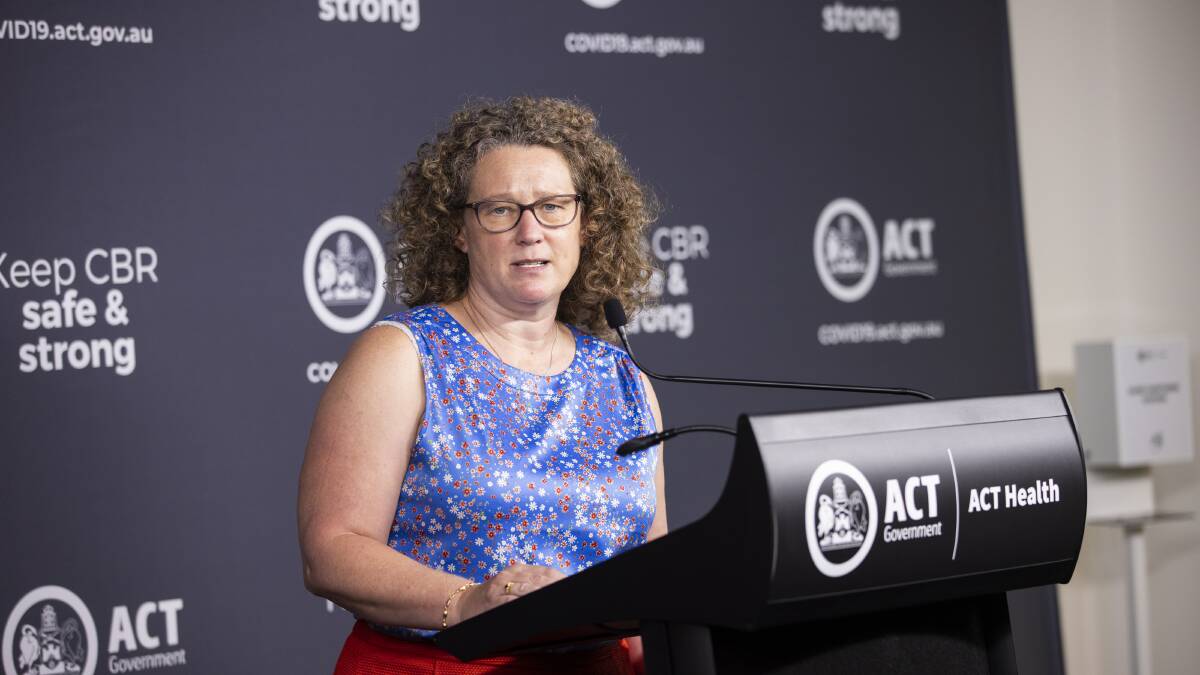
The ACT's chief health officer has appeared at a press conference only once since the start of the year, while her NSW counterpart fronted the cameras 23 times in the same period.
Dr Kerryn Coleman has made the fewest public appearances this year compared to her eastern state counterparts, despite the most significant number of COVID-19 infections in the territory since the pandemic began.
Dr Coleman has addressed two press conferences since December 23, while chief health officers from Victoria, Queensland and NSW have made, in some cases, dozens of appearances.
The ACT government is expected to hold a press conference on Friday to announce what changes will be made to restrictions in the territory, following announcements of further easing in Victoria and NSW.
Dr Coleman last appeared at a press conference on January 5, having appeared previously on December 23.
While Dr Coleman, or her deputy, Dr Vanessa Johnston, appeared regularly throughout the spring lockdown's daily press conferences, the pair were absent from public briefings as case numbers rose to record levels in mid-January as the Omicron wave took hold.
In the period since December 23, NSW's chief health officer, Dr Kerry Chant, has addressed the media 28 times. Queensland's chief health officer, Dr John Gerrard, who assumed the role in mid-December, has addressed the media 53 times in 55 days.
While the Victorian chief health officer, Professor Brett Sutton, has addressed the media only three times since December 23, the state's COVID response commander, Jerome Weimar, has appeared 13 times.
A spokeswoman for ACT Health on Wednesday said Health Minister Rachel Stephen-Smith and Dr Coleman discussed possible media appearances to decide who was the "most appropriate spokesperson".
The spokeswoman said Dr Coleman gave approximately five interviews, including media briefings, stand ups and interviews, between December 23 and February 16, and ACT Health had responded to many other written media enquiries.
Ms Stephen-Smith gave approximately 40 media interviews in the period between December 23 and February 16, she said.
"Dr Coleman is happy to provide media outlets with updates on the COVID-19 situation in the ACT when appropriate and these can be arranged on request."
The Canberra Times on Wednesday asked if Dr Coleman was available for an interview, but this question was ignored in the statement provided.
Dr Andrew Hughes, a marketing and communications academic at the Australian National University, said Dr Coleman's absence from COVID press conferences since the start of the year will have affected perceived credibility in the government.
He said it was important to have the chief health officer, or even the deputy, present at the COVID briefings to provide confidence to the public that there were medical professionals informing public health decisions.
"The credibility factor of a public official like a chief health officer is so much higher than of a politician," Dr Hughes said.
"The Health Minister might be across that information, but they aren't a qualified doctor."
Dr Hughes stressed that the visibility of qualified experts throughout all COVID messaging is critical to combatting misinformation and build up ongoing COVID awareness in the community.
He said it was important for Dr Coleman to front the cameras again, because her appearances were linked to the trust of Canberrans in the government and its COVID messaging.
"She will need to provide an explanation to people, to kill any doubt people might have in her. Removing any doubt from the public is critical with all pandemic messaging," he said.
Dr Hughes emphasised the importance of playing the long game with information campaigns addressing safe COVID practices in the community
He said it was important to bring the chief health officer back into the public domain for continuity and trust in the response to the pandemic.
"The future campaigns you are wanting to run are built on the current campaigns you are doing right now," he said.
The University of New South Wales' Professor Evelyne de Leeuw, who has worked on an international project to understand the role of chief medical and health officers in the pandemic, said it was important for chief health officers to be accountable to the public.
"Public health is not for nothing called public health. You can't do public health in secret. There needs to be an accountability mechanism," Professor de Leeuw said.
However, she said most public health professionals needed more training to learn how to be accountable to the public and navigate the competing interests of political need and expert advice.
"I think most politicians see the value of grounding your argument in some degree of factual evidence. But the trade of politics is that you need to deal with your constituencies. You need to address the worries of the people," she said.
Professor de Leeuw said as the system of COVID restrictions was pulled apart - through a combination of rising case numbers, and politicians choosing economic recovery over minimising virus transmission - the need for chief health officers to appear publicly was reduced.
"By default, because the system had started to unravel, because the politicians didn't commit to maintaining the system and projected other messages, [the chief health officers'] role was no longer required or at least as prominent as it had been in the past," she said.
with Lara Stimpson







